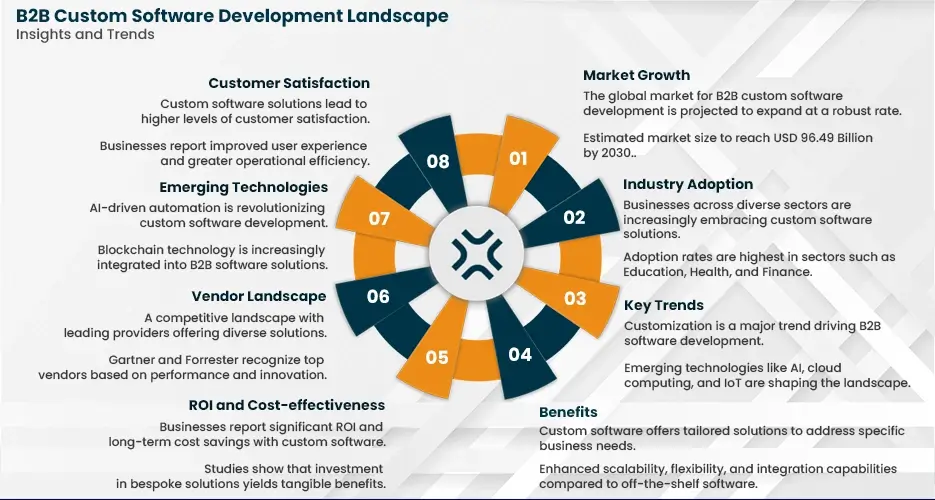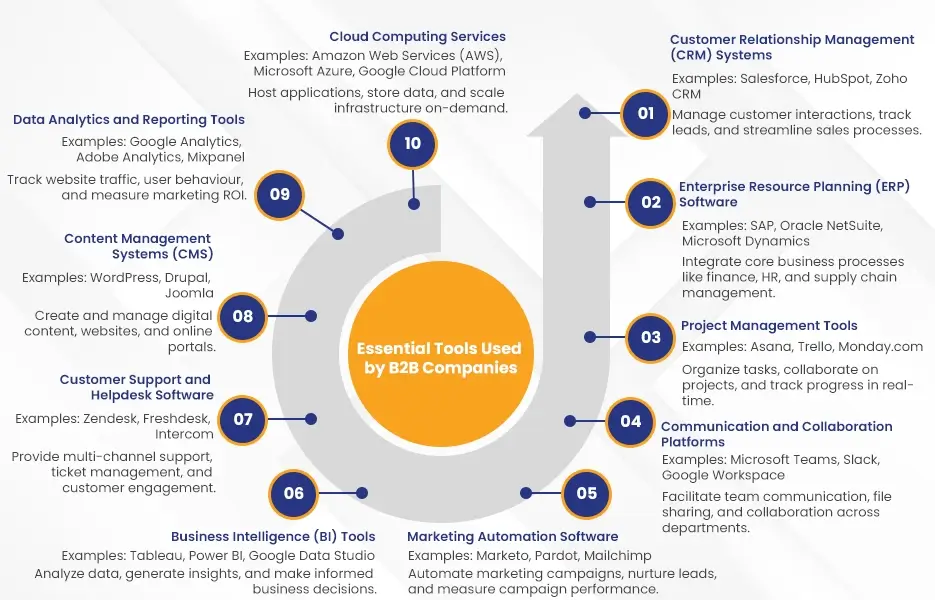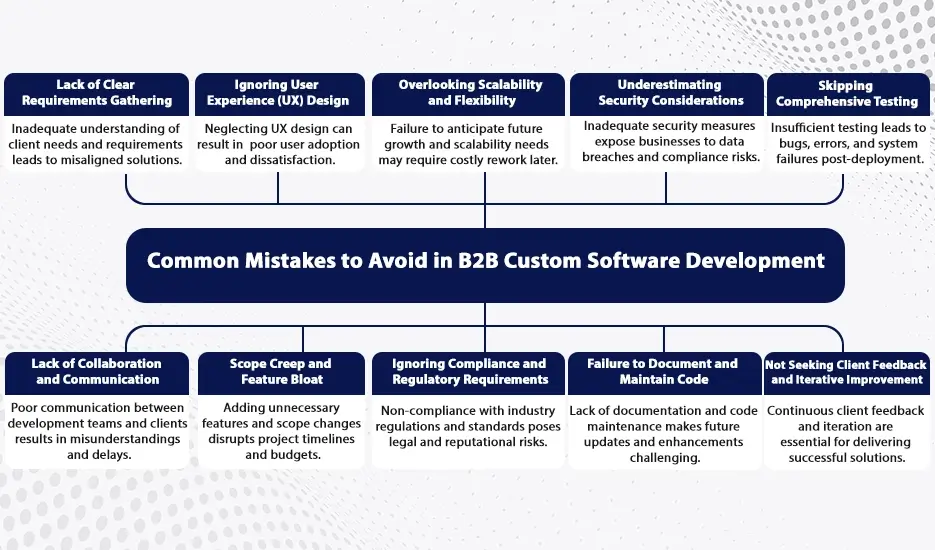Table of Contents
Custom software solutions are becoming popular among B2B organizations. Gaining a competitive edge, streamlining processes, and attending to the particular requirements of partners and clients are their goals. Custom software development offers tailored solutions planned for the requirements of B2B Custom Software companies, giving adaptability, versatility, and usefulness that off-the-shelf software fails to convey.
In the B2B space, interest in custom software development has been growing. Factors like expanding digitization, moving purchaser assumptions, and the need for more noteworthy productivity and nimbleness in business operations, drive this trend. After doing a continuous analysis, experts predict that B2B enterprises will propel the expansion of the global custom software development services market, which is anticipated to reach USD 259.51 billion by 2025.
One of the important benefits of custom software development for B2B organizations is the ability to address business hardships and requirements with exactness and accuracy. Custom enterprise software development can be tailored to meet the extraordinary requirements and focus of each B2B client. They can overhaul supply chain management, enhance customer relationship management, and improve data analytics capabilities.
Understanding Custom Software for B2B Businesses
The most well-known method for creating customized software is business-to-business custom software development. We expect B2B enterprises to address the original requirements and incites. Custom software is not like off-the-shelf software groups. The team works from scratch, taking into account the specific requirements, work processes, and focuses of the affiliation.
In B2B custom software development, the consideration is on creating solutions that streamline business processes, further foster capability, and work on skill. Projections suggest a significant growth trajectory, with an estimated compound annual growth rate (CAGR) of 22.4% between 2023 and 2030. These solutions range from industry-specific software applications and data analytics dashboards to enterprise resource planning (ERP) platforms and customer relationship management (CRM) systems.
By understanding the complexities of B2B operations and teaming up with clients, custom software designers can convey solutions that address recent concerns as well as have the adaptability to adjust and scale as the business develops and advances.

Significance of Custom Software for B2B Businesses
For numerous reasons, custom software plays a crucial role in B2B company outcomes. It enables businesses to customize software solutions to meet the specific needs of their operations. This attests to their value and emphasizes how critical it is to spur development and accomplish their goals.
When it comes to versatility, custom software surpasses off-the-shelf options. It enables companies to modify and customize their software as required. This is something that B2B Software Development Services can accomplish to adapt to modifications in the market, industry standards, or internal procedures.
Moreover, custom software can give a competitive benefit by empowering B2B businesses to separate themselves from their competitors. One of the main issues the development team has is managing load testing and continuous performance, according to about 17.70% of the firms surveyed. By utilizing customized solutions that are tailored to their requirements, organizations can upgrade their operations, improve customer encounters, and outperform rivals in the marketplace.
Custom software is fundamental for B2B businesses. It helps them stay ahead in today’s fast-paced business environment.
Ready to Elevate Your Business. Click Here to Explore Our Custom Software Services!
Investigating Methodologies for Custom Software Development
Custom software development employs various methodologies to ensure the effective delivery of solutions that address B2B client needs. A few normal methodologies include:
1. Agile Development
Agile development approaches, such as Scrum and Kanban, emphasize collaboration, flexibility, and iterative development. Agile Software Development is arguably the most recent innovation in the industry, with a broad implementation reported by 61.50% of the surveyed organizations. This method ensures that the end product satisfies the client’s needs by accounting for frequent feedback and adjustments.
2. Waterfall Method
Each period of the development process in the waterfall model finishes before moving on to the next, following a successive method that includes requirements gathering, design, development, and testing. About 23.10% of the participants state that they employ GitHub. While less adaptable than agile, the waterfall model can be reasonable for projects with clear-cut requirements.
3. DevOps Practices
DevOps focuses on coordinating development and operations groups to streamline the software conveyance process. By taking on DevOps practices, B2B custom software engineers can automate assignments, 7.70% of the developers can deliver a typical software with basic features in a time further develop joint efforts, and speed up an opportunity to advertise new solutions.
By investigating and choosing the right methodologies for custom software development projects, B2B businesses can guarantee effective project execution and the conveyance of high-quality, tailored solutions that meet their particular necessities and requirements.meet their particular necessities and requirements.

13 Best Practices for Building B2B Custom Software with A3Logics
Building custom software solutions for B2B clients requires a strategic approach. It prioritizes functionality, scalability, and user satisfaction. At A3Logics, we understand the complexities involved in developing tailored software solutions. We make sure these solutions line up with our client’s specific business objectives. To ensure the success of each project, we adhere to a set of best practices. They are crafted to optimize the development process and deliver exceptional results.
In this section, we will explore 13 best practices. They will help you build B2B custom software with A3Logics. Each practice plays a pivotal part, from requirements gathering and analysis to continuous support and maintenance. B2B Custom Software Development Companies ensure the successful development, deployment, and maintenance of custom software solutions. We enable our clients to realize the full potential of custom software by comprehending and putting these best practices into reality. This drives business growth and advancement.
1. Requirements Gathering and Analysis
This involves completely understanding the client’s needs, objectives, and expectations for the software. Detailed analysis helps in defining clear project requirements.
2. Clear and Transparent Communication
Effective communication between the development team and the client ensures alignment throughout the project. Transparency in conversations and updates fosters trust and collaboration.
3. Agile Development Method
Agile development promotes iterative development, considering flexibility and transformation to evolving requirements. Regular feedback circles ensure that the software meets evolving business needs.
4. Scalability and Flexibility
Building software with scalability in mind ensures it can grow and adapt as the business expands or requirements change. Flexibility takes into account easy changes and updates.
5. User-Centric Design
Focusing on user experience (UX) and user interface (UI) design ensures that the software is intuitive and easy to use. Many custom software development company in USA also ensures that the software meets the needs of end-users.
6. Integration with Existing Systems
Seamless integration with existing software systems and infrastructure ensures interoperability. It also avoids interruptions to business operations.
7. Comprehensive Testing
Exhaustive testing at each stage of development ensures that the software capabilities are free of bugs and errors. It also ensures that the software meets quality standards.
8. Security Measures
Implementing robust security measures protects sensitive data and ensures compliance with industry regulations. Security Considerations in Custom Software Development Services include encryption, authentication, access control, and regular security reviews.
9. Continuous Support and Maintenance
Offering continuous help and maintenance services ensures that the software remains operational. It also keeps it secure and informed about technological advancements.
10. Compliance and Regulatory Considerations
Adhering to relevant regulations and industry standards ensures legal compliance. It also reduces the chances of resistance.
11. Data Privacy and Protection
Implementing measures to safeguard data privacy and protection is critical. These measures include data encryption, secure storage, and access controls. They are essential for maintaining trust and compliance.
12. Performance Optimization
Improving software performance ensures a seamless user experience. It maximizes the software’s effectiveness by increasing speed, efficiency, and scalability.
13. Feedback and Iteration Process
We request feedback from users and stakeholders. We integrate it into iterative development cycles. This considers continuous improvement and refinement of the software. Integrate it into iterative development cycles. This considers continuous improvement and refinement of the software.

Common Challenges in B2B Custom Software Development and How to Overcome Them
B2B custom software development presents unique challenges. These can hinder project success if not addressed. Some common challenges include:
Rule Volatility
B2B projects often face changing requirements. This happens because business needs or market conditions evolve. This volatility can upset project timelines and increase development costs. The price range, from the received information, for software development projects ranged from $10,000 to $120,000.
Solution: Put in place agile methodologies that focus on flexibility and adaptability. Consider frequent iterations and adjustments to accommodate evolving requirements. Lead regular stakeholder meetings. Gather feedback and ensure alignment throughout the development process. Use project management tools to follow changes and manage requirements.
Integration Complexity
Integrating custom software with existing systems and outsider applications can be complex and challenging. This can lead to similarity issues and delays.
Solution: Direct careful similarity assessments and system reviews to identify potential integration challenges. Use APIs and middleware to ease seamless integration between disparate systems. Collaborate with the best custom software development companies and external vendors. Address integration complexities and ensure interoperability.
Budget and Timeline Constraints
Budget constraints and tight timelines can pose critical challenges in B2B custom software development. This can lead to compromises in quality or scope.
Solution: Focus on project planning and resource allocation. This will optimize budget use and ensure timely delivery. Break down project requirements into manageable milestones. Focus on features based on business value and urgency. Be open and communicate with stakeholders about budget and timeline constraints. Be ready to make trade-offs or adjustments on a case-by-case basis.
Security Concerns
Challenge: Security is a top need in B2B custom software development, especially when dealing with sensitive business data. Failure to put in place robust security measures can result in data breaches and compliance infringement.
Solution: Install comprehensive security measures. Examples include encryption, access controls, and vulnerability assessments. Custom Software Consulting Companies In USA will safeguard data and protect against cyber threats. Adhere to industry best practices and regulatory requirements, such as GDPR and HIPAA. This ensures compliance and reduces risks.
By addressing these common challenges and implementing effective solutions, businesses can avoid risks. They can ensure the successful development and deployment of custom software solutions. We tailor the solutions to their specific needs and objectives.
ROI of B2B Custom Software Development: Measuring Success
B2B custom software development projects represent a huge investment for businesses. They must have both time and financial resources. Thus, it’s essential to measure the return on investment to determine the success and effectiveness of these projects. ROI is a metric used to test the profitability or value generated by an investment relative to its cost.
Cost Savings
One method for measuring the ROI of custom software development is by assessing the cost savings achieved through the software’s implementation. This includes identifying areas where the software has streamlined processes, automated tasks, or reduced difficult work. This has led to tangible cost reductions for the business. Custom Software Integration, for example, might drop the need for many standalone systems or reduce reliance on manual data entry. This leads to operational efficiencies and cost savings over time.
Increased Productivity
Another factor to consider when measuring ROI is the impact of custom software on productivity. Custom software can contribute to increased productivity and results. It does this by giving employees tools and features that enhance their efficiency and effectiveness in performing their assignments. This might include features like automation, real-time data access, or work process optimization. These features enable employees to achieve more in less time.
Revenue Growth
Custom software can also drive revenue growth for businesses. It can enable new revenue streams, improve customer satisfaction, and enhance competitiveness in the marketplace. For example, custom software might help the send-off of new items or services. It could also improve customer retention through enhanced user experiences. Or, it could differentiate the business from competitors through unique features or offerings. By quantifying the revenue generated as a result of custom software implementation, businesses can assess the ROI of their investment.
Competitive Advantage
Custom software can give businesses a competitive edge. It allows them to stand out from their competitors, respond to market demands, and adapt to industry trends. This intangible value can be hard to measure yet is essential for assessing the success and ROI of custom software development projects.
In summary, measuring the ROI of B2B custom software development involves assessing the cost savings and productivity gains achieved through the software’s implementation. It also involves evaluating the revenue growth and competitive advantage gained. Businesses can test these factors against the underlying investment. Then, they can determine the success and effectiveness of their custom software projects. Additionally, it’s urgent to consider tangible and intangible benefits when working out ROI. This will help you understand the value created by custom software development projects.
Emerging Trends in B2B Custom Software Development
B2B custom software development is evolving. Technological advancements and changing market dynamics drive it. Some emerging trends in the field include:
> AI and Machine Learning
Edge computing is gaining traction in B2B custom software development. It enables data processing and analysis to happen closer to the source. This reduces latency and improves performance.
Businesses can use new technologies and developments to drive growth. They do this by keeping up with emerging trends. This helps them remain ahead of the competition.
Case Studies: Real-world Examples of Successful B2B Custom Software Projects
AI and machine learning technologies are being integrated into custom software solutions. They automate undertakings, analyze data, and improve decision-making.
IoT Integration
The Internet of Things (IoT) is revolutionizing B2B industries. It enables devices and systems to connect and communicate. Custom software solutions using IoT integration to gather real-time data. They optimize processes and enhance efficiency.
- Blockchain Technology
Blockchain technology is being adopted in B2B custom software development. It enhances security, transparency, and confidence in transactions and data exchanges. - Cloud Computing
Cloud-based custom software solutions offer scalability, flexibility, and cost-efficiency. They permit businesses to access resources and services on demand and from anywhere.
Edge Computing
In this section, we showcase real-world examples of successful B2B custom software projects. These case studies highlight our expertise, capabilities, and history. We have delivered innovative solutions. Hire Custom Software Development Company to address our client’s specific business challenges and objectives. Each case study provides knowledge of the project scope, challenges faced, solutions implemented, and outcomes achieved. This demonstrates the tangible impact of our custom software development services.
Custom ERP Solution for the Manufacturing Industry
A leading manufacturing organization partnered with a software development firm. They aimed to construct a custom Enterprise Resource Planning (ERP) system. With 84.70%, a huge mass of the surveyed companies from the software industry develop Enterprise Applications for clients. Their unique creation processes would tailor the system. They would also tailor it to their supply chain management needs. The custom software integrated modules for inventory management. It also included creation scheduling, quality control, and sales order processing. As a result, the manufacturing organization improved operational efficiency. It reduced lead times and enhanced perceivability in its entire manufacturing operations.
Bespoke CRM Platform for Financial Services
A financial services firm collaborated with a software development agency. They developed a custom CRM platform. About 15.40% of agencies stated that they provide Customer Relationship Management. It streamlines client management and financial planning processes. The custom software included features. For example, custom software development outsourcing has client onboarding. It also had portfolio management, financial fair following, and reporting functionalities. The financial services firm improved client engagement, counsel productivity, and assets under management. They did this by implementing a custom CRM platform.
Tailored Supply Chain Management Solution for the Retail Sector
A global retail partnership worked with a software development organization. Their goal was to create a tailored Supply Chain Management (SCM) solution. The solution would optimize inventory management and coordinate factors operations. Existing systems integrate with the custom software. Top 10 Custom Software Development Companies In USA provided features for demand forecasting, order fulfilment, warehouse management, and transportation optimization. As a result, the retail company improved inventory accuracy. This reduced stockouts and increased supply chain visibility. This led to enhanced customer satisfaction and profitability.
Personalized E-commerce Platform for Wholesale Distribution
A wholesale distribution organization engaged a software development partner. They developed a personalized E-commerce platform to streamline B2B transactions. They also made it easier to manage orders. The custom software offers features such as customer-specific estimating, mass ordering, inventory following, and integration with outside logistics providers. The wholesale distributor deployed a custom E-commerce platform. This enhanced customer convenience, increased order precision, and expanded its online sales channels. As a result, the distributor achieved higher revenue and market share.
Tailor-Made Analytics Dashboard for the Healthcare Industry
A healthcare association collaborated with a software development agency. They created a tailor-made analytics dashboard. It is for examining patient outcomes, resource use, and financial performance. The custom software aggregated data from electronic health records (EHR) and charging systems. It also gathered data from patient satisfaction surveys. The software provided actionable knowledge and performance metrics to healthcare administrators and providers. The healthcare association improved clinical decision-making. It optimized resource assignment and enhanced patient care quality. They did this by using the custom analytics dashboard.
These examples prove the diverse applications and benefits of B2B custom software development. Different industries and sectors see them. They show that customized software can address business challenges. Tailored software can drive tangible results for organizations.
Take the Next Step Towards Innovation! Request a Demo of Our Custom Software Solutions.
Future Outlook: Evolving Technologies and Their Impact on B2B Custom Software
Technology is advancing. The future outlook for B2B custom software development is promising. Emerging technologies will reshape the B2B landscape. These technologies include artificial intelligence (AI) and machine learning (ML). Best Software Development Model also includes blockchain and the Internet of Things (IoT). They offer new opportunities and possibilities for development. In this section, we explore how these technologies could impact custom software development for businesses. We also discuss how businesses can use them to drive growth, efficiency, and competitiveness in the computer age.
Evolving technologies shape the future of B2B custom software development. These technologies are ready to revolutionize business operations and propel advancement. Some key trends and technologies to look out for include:
Artificial Intelligence (AI) and Machine Learning (ML)
AI and ML technologies are changing B2B custom software development. They enable predictive analytics, automate repetitive errands, and create personalized user experiences. Experts expect AI-driven solutions to become more prevalent in areas. For example, in customer relationship management, data analytics, and process optimization.
Internet of Things (IoT)
The growth of IoT devices and sensors is creating new opportunities for developing custom software. This is happening in industries like manufacturing, operations, and healthcare. This is especially true for B2B services. 47% of industry chiefs stake their focus on the Internet of Things. Custom software solutions leverage IoT technology. These can enable real-time monitoring, predictive maintenance, and intelligent asset management. This leads to improved operational efficiency and cost savings.
Blockchain Technology
Blockchain technology is gaining traction in B2B custom software development. It has the potential to enhance security and transparency. It can also boost confidence in transactions and data exchanges. 56% of the service providers concurred with the promising future of Blockchain Technology. Custom software solutions integrating blockchain can ease secure peer-to-peer transactions. Custom software development consulting also helps with supply chain following. They also help with advanced identity verification, among other applications.
Cloud Computing
Cloud-based custom software solutions offer scalability, flexibility, and cost-efficiency. This makes them well-known among B2B organizations. Cloud computing enables businesses to access resources and services on demand. It also helps them optimize infrastructure costs. It speeds up time-to-market for new items and services.
Edge Computing
Edge computing is emerging as a basic technology in B2B custom software development. It enables data processing and analysis to happen closer to the source. This reduces latency and improves performance. Edge computing is especially relevant in industries like manufacturing, retail, and healthcare. Real-time data processing is essential for decision-making and automation in these fields.
Collaborative Approach: How A3Logics Partners with Clients in B2B Custom Software Projects
At A3Logics, we take a collaborative approach to B2B custom software development. We work with our clients as strategic partners throughout the project lifecycle. Our collaborative approach includes:
1. Need Gathering
We engage in exhaustive conversations with clients. We do this to understand their business objectives, requirements, and challenges. Custom Software vs. Off-the-Shelf Software ensures alignment and lucidity all along.
2. Transparent Communication
At A3Logics, We maintain open and transparent communication channels with clients. We give regular updates, progress reports, and opportunities for feedback and info.
3. Agile Methodologies
We use agile methodologies, like Scrum or Kanban. A considerable chunk of software firms, around 23.10%, use Scrum or the adapted versions. They enable iterative development, flexibility, and responsiveness to changing requirements and priorities.
4. Continuous Collaboration
We encourage continuous collaboration between our development team and clients. This fosters a sense of ownership, accountability, and shared success. We collaborate to ensure our custom software matches our client’s needs and expectations. This approach drives value and delivers tangible results.
Conclusion: Harnessing The Power of B2B Custom Software with A3Logics
Finally, the development of custom software for business-to-business presents unique challenges and opportunities. It can help companies get a competitive edge in the market. Custom software development company in USA can boost growth, development, and success for software development services. They can accomplish this by overcoming typical roadblocks. able to measure ROI. Also, they could take a cooperative stance and have access to real-world case studies. A3Logics is dedicated to partnering with its clients. Our software solutions are tailored specifically to meet their needs and objectives. This gives them the chance to survive in the unique business environment of today.
Frequently Asked Questions (FAQs)
1. What is Custom Software Development?
Custom software development is the most common way of planning software that is exceptionally produced for a gathering of clients inside an organization. It is worked to address explicit clients’ requirements and is seen as more compelling than commercial off-the-shelf software (COTS).
2. Why Would any Organization Want Or Need Custom Software?
For the most part, businesses and nonprofits invest in custom software development since they need to make acquires in proficiency. For instance, they might want a helpful stage that customers can use to submit rehash requests, or supervisors can plan explicit types of work from any place continuously. Moreover, custom software can be utilized to take out or robotize dull undertakings like information sections or to oversee a great many individuals or endorsers at the same time. No matter what the particular use, custom software is about proficiency, better correspondence, and quicker work.
3. How Can We Get Quality Custom Software Development?
We could pass along a ton of information with regards to custom software development, however, a ton of it boils down to a couple of basic orders. The first is to understand what you’re attempting to assemble or achieve. You ought to never neglect to focus on that in the plan cycle. The second is to just work with specialists who understand what they’re doing. Custom software development is confounded, yet it gets more straightforward when you’ve fabricated many of them. However long you don’t fail to focus on these two focuses, you’ll constantly be pushing toward getting a completed item that can assist your business or organization with growing. Regardless of your particular difficulties or necessities, that is generally the genuine objective eventually.
4. How Much Does Software Development Cost?
The cost of making custom software relies upon its intricacy, the frameworks to be coordinated and the help required. Therefore, it’s unrealistic to gauge the development cost of custom software without knowing the requirement/SOW.
5. How Long Does It Take to Develop Custom Software?
The suitable time it takes to develop custom software relies upon its type and intricacy. To realize the specific time to foster your software, you can counsel our software development team or have a gathering with them, and we will hit you up with the responses.





